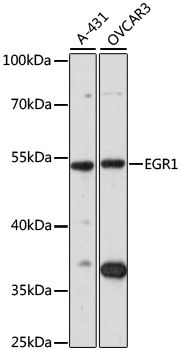-
Product Name
EGR1 Polyclonal Antibody
- Documents
-
Description
Polyclonal antibody to EGR1
-
Tested applications
WB, IHC
-
Species reactivity
Human, Mouse, Rat
-
Alternative names
EGR1 antibody; AT225 antibody; G0S30 antibody; KROX-24 antibody; NGFI-A antibody; TIS8 antibody; ZIF-268 antibody; ZNF225 antibody; early growth response 1 antibody
-
Isotype
Rabbit IgG
-
Preparation
Antigen: Recombinant fusion protein containing a sequence corresponding to amino acids 1-250 of human EGR1 (NP_001955.1).
-
Clonality
Polyclonal
-
Formulation
PBS with 0.02% sodium azide, 50% glycerol, pH7.3.
-
Storage instructions
Store at -20℃. Avoid freeze / thaw cycles.
-
Applications
WB 1:200 - 1:1000
IHC 1:20 - 1:200
IF 1:10 - 1:100
IP 1:20 - 1:50 -
Validations

Western blot - EGR1 Polyclonal Antibody
Western blot analysis of extracts of various cell lines, using EGR1 antibody at 1:1000 dilution.Secondary antibody: HRP Goat Anti-Rabbit IgG (H+L) at 1:10000 dilution.Lysates/proteins: 25ug per lane.Blocking buffer: 3% nonfat dry milk in TBST.Detection: ECL Basic Kit .Exposure time: 90s.
-
Background
Transcriptional regulator. Recognizes and binds to the DNA sequence 5'-GCG(T/G)GGGCG-3'(EGR-site) in the promoter region of target genes (By similarity). Binds double-stranded target DNA, irrespective of the cytosine methylation status. Regulates the transcription of numerous target genes, and thereby plays an important role in regulating the response to growth factors, DNA damage, and ischemia. Plays a role in the regulation of cell survival, proliferation and cell death. Activates expression of p53/TP53 and TGFB1, and thereby helps prevent tumor formation. Required for normal progress through mitosis and normal proliferation of hepatocytes after partial hepatectomy. Mediates responses to ischemia and hypoxia; regulates the expression of proteins such as IL1B and CXCL2 that are involved in inflammatory processes and development of tissue damage after ischemia. Regulates biosynthesis of luteinizing hormone (LHB) in the pituitary (By similarity). Regulates the amplitude of the expression rhythms of clock genes: ARNTL/BMAL1, PER2 and NR1D1 in the liver via the activation of PER1 (clock repressor) transcription. Regulates the rhythmic expression of core-clock gene ARNTL/BMAL1 in the suprachiasmatic nucleus (SCN) (By similarity).
Related Products / Services
Please note: All products are "FOR RESEARCH USE ONLY AND ARE NOT INTENDED FOR DIAGNOSTIC OR THERAPEUTIC USE"
